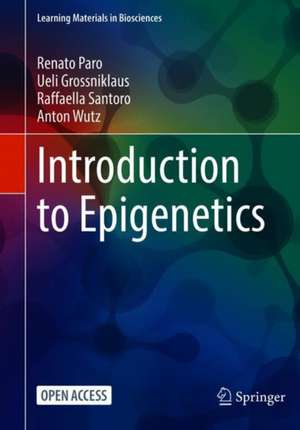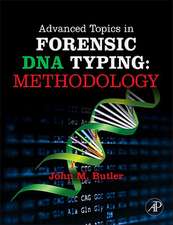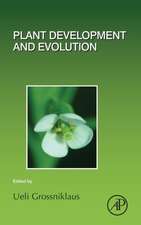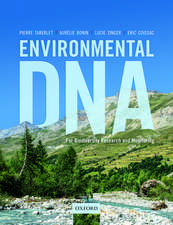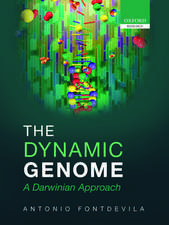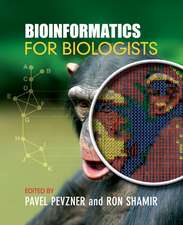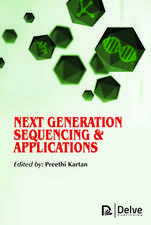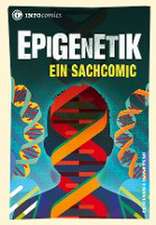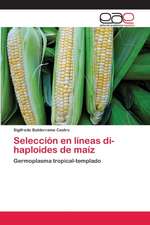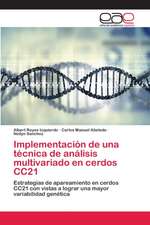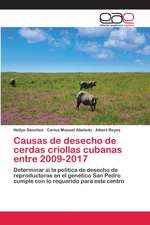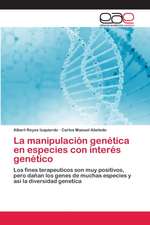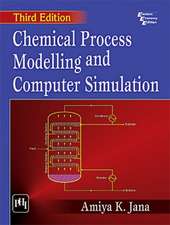Introduction to Epigenetics: Learning Materials in Biosciences
Autor Renato Paro, Ueli Grossniklaus, Raffaella Santoro, Anton Wutzen Limba Engleză Paperback – 24 mar 2021
After reading this book, the student will:
- Have an understanding of the basic toolbox of epigenetic regulation
- Know how genetic and epigenetic information layers are interconnected
- Be able to explain complex epigenetic phenomena by understanding the structures and principles of the underlying molecular mechanisms
- Understand how misregulated epigenetic mechanisms can lead to disease
Din seria Learning Materials in Biosciences
- 17%
 Preț: 394.87 lei
Preț: 394.87 lei - 20%
 Preț: 506.68 lei
Preț: 506.68 lei - 5%
 Preț: 529.76 lei
Preț: 529.76 lei - 5%
 Preț: 338.39 lei
Preț: 338.39 lei - 5%
 Preț: 330.25 lei
Preț: 330.25 lei -
 Preț: 347.49 lei
Preț: 347.49 lei - 5%
 Preț: 561.91 lei
Preț: 561.91 lei - 17%
 Preț: 426.67 lei
Preț: 426.67 lei - 17%
 Preț: 457.76 lei
Preț: 457.76 lei - 5%
 Preț: 491.25 lei
Preț: 491.25 lei - 17%
 Preț: 457.86 lei
Preț: 457.86 lei - 17%
 Preț: 490.61 lei
Preț: 490.61 lei - 17%
 Preț: 424.90 lei
Preț: 424.90 lei - 5%
 Preț: 414.83 lei
Preț: 414.83 lei - 17%
 Preț: 458.26 lei
Preț: 458.26 lei - 13%
 Preț: 383.66 lei
Preț: 383.66 lei - 17%
 Preț: 396.09 lei
Preț: 396.09 lei - 5%
 Preț: 797.65 lei
Preț: 797.65 lei - 20%
 Preț: 345.74 lei
Preț: 345.74 lei - 5%
 Preț: 797.65 lei
Preț: 797.65 lei - 17%
 Preț: 428.12 lei
Preț: 428.12 lei - 5%
 Preț: 671.48 lei
Preț: 671.48 lei - 19%
 Preț: 397.78 lei
Preț: 397.78 lei -
 Preț: 339.79 lei
Preț: 339.79 lei - 15%
 Preț: 527.97 lei
Preț: 527.97 lei - 19%
 Preț: 477.46 lei
Preț: 477.46 lei - 5%
 Preț: 583.96 lei
Preț: 583.96 lei - 19%
 Preț: 436.50 lei
Preț: 436.50 lei - 5%
 Preț: 527.90 lei
Preț: 527.90 lei - 15%
 Preț: 494.85 lei
Preț: 494.85 lei - 15%
 Preț: 466.45 lei
Preț: 466.45 lei - 15%
 Preț: 494.85 lei
Preț: 494.85 lei - 5%
 Preț: 524.97 lei
Preț: 524.97 lei - 15%
 Preț: 533.72 lei
Preț: 533.72 lei - 15%
 Preț: 528.99 lei
Preț: 528.99 lei -
 Preț: 353.65 lei
Preț: 353.65 lei - 5%
 Preț: 595.01 lei
Preț: 595.01 lei - 15%
 Preț: 527.48 lei
Preț: 527.48 lei
Preț: 358.43 lei
Nou
Puncte Express: 538
Preț estimativ în valută:
68.59€ • 71.35$ • 56.63£
68.59€ • 71.35$ • 56.63£
Carte disponibilă
Livrare economică 24 martie-07 aprilie
Livrare express 08-14 martie pentru 31.37 lei
Preluare comenzi: 021 569.72.76
Specificații
ISBN-13: 9783030686697
ISBN-10: 3030686698
Pagini: 215
Ilustrații: XII, 215 p. 81 illus., 77 illus. in color.
Dimensiuni: 168 x 240 x 18 mm
Greutate: 0.37 kg
Ediția:1st ed. 2021
Editura: Springer International Publishing
Colecția Springer
Seria Learning Materials in Biosciences
Locul publicării:Cham, Switzerland
ISBN-10: 3030686698
Pagini: 215
Ilustrații: XII, 215 p. 81 illus., 77 illus. in color.
Dimensiuni: 168 x 240 x 18 mm
Greutate: 0.37 kg
Ediția:1st ed. 2021
Editura: Springer International Publishing
Colecția Springer
Seria Learning Materials in Biosciences
Locul publicării:Cham, Switzerland
Cuprins
Biology of Chromatin.- Chromatin Dynamics.- Cellular Memory.- Dosage Compensation Systems.- Genomic Imprinting.- RNA-based Mechanisms of Gene Silencing.- Regeneration and Reprogramming.- Epigenetics and Cancer.- Epigenetics and Metabolism.
Notă biografică
Renato Paro received his Ph.D. at the Biozentrum of the University of Basel. After postdoctoral stays at the University of Edinburgh and Stanford University, he continued his career at the Center for Molecular Biology of the University of Heidelberg (ZMBH) in Germany. In 2000 became Professor at the Faculty of Medicine and Faculty of Biosciences of the University of Heidelberg and acting director of the ZMBH. In 2006 he was appointed founding chair of the new Department of Biosystems Science and Engineering (D-BSSE) of the ETH Zurich in Basel and Professor of Biosystems at the University of Basel. The major research areas of his laboratory focused on mechanisms of epigenetic gene control and cellular signaling. He is now Emeritus Professor.
Ueli Grossniklaus is Professor of Plant Developmental Genetics and Director of the Department of Plant and Microbial Biology of the University of Zurich. Grossniklaus earned his PhD working on Drosophila development under the mentorship of Walter J. Gehring at the University of Basel. Extending concepts and experimental approaches from Drosophila to plants, he has led thriving research groups investigating the molecular basis of plant reproduction, first at Cold Spring Harbor Laboratory in the U.S.A. and, since 2000, at the University of Zurich in Switzerland. Grossniklaus’ group made seminal contribution to understanding the epigenetic mechanisms that control of seed development, in particular gene regulation by Polycomb-group proteins and genomic imprinting. Raffaella Santoro is Professor of Epigenetics and Chromatin Dynamics at the University of Zurich. She studied Chemistry at the University of Rome La Sapienza where she also obtained her PhD in Biochemistry. After a post-doctoral stay at the German Cancer Research Center in Heidelberg, in 2007 she became group leader at ETH and thereafter at the University of Zurich. Since 2015, she is a member of the European Molecular Biology Laboratory (EMBL). In 2018 was awarded of an European Research Council Advanced Grant. Her main area of research lies in the analysis of epigenetic and chromatin regulation and the dynamics of genome organization and how their alterations contribute to complex diseases such as cancer.
Anton Wutz is Professor of Genetics at the Institute of Molecular Health Sciences at the ETH Zurich. He studies nuclear mechanisms that regulate changes of cellular identity during stem cell differentiation. His laboratory has contributed to the development of new genetic strategies for studying mammalian pathways of gene regulation and concepts of how these act to specify the diverse cell types of the body.
Ueli Grossniklaus is Professor of Plant Developmental Genetics and Director of the Department of Plant and Microbial Biology of the University of Zurich. Grossniklaus earned his PhD working on Drosophila development under the mentorship of Walter J. Gehring at the University of Basel. Extending concepts and experimental approaches from Drosophila to plants, he has led thriving research groups investigating the molecular basis of plant reproduction, first at Cold Spring Harbor Laboratory in the U.S.A. and, since 2000, at the University of Zurich in Switzerland. Grossniklaus’ group made seminal contribution to understanding the epigenetic mechanisms that control of seed development, in particular gene regulation by Polycomb-group proteins and genomic imprinting. Raffaella Santoro is Professor of Epigenetics and Chromatin Dynamics at the University of Zurich. She studied Chemistry at the University of Rome La Sapienza where she also obtained her PhD in Biochemistry. After a post-doctoral stay at the German Cancer Research Center in Heidelberg, in 2007 she became group leader at ETH and thereafter at the University of Zurich. Since 2015, she is a member of the European Molecular Biology Laboratory (EMBL). In 2018 was awarded of an European Research Council Advanced Grant. Her main area of research lies in the analysis of epigenetic and chromatin regulation and the dynamics of genome organization and how their alterations contribute to complex diseases such as cancer.
Anton Wutz is Professor of Genetics at the Institute of Molecular Health Sciences at the ETH Zurich. He studies nuclear mechanisms that regulate changes of cellular identity during stem cell differentiation. His laboratory has contributed to the development of new genetic strategies for studying mammalian pathways of gene regulation and concepts of how these act to specify the diverse cell types of the body.
Textul de pe ultima copertă
This open access textbook leads the reader from basic concepts of chromatin structure and function and RNA mechanisms to the understanding of epigenetics, imprinting, regeneration and reprogramming. The textbook treats epigenetic phenomena in animals, as well as plants. Written by four internationally known experts and senior lecturers in this field, it provides a valuable tool for Master- and PhD- students who need to comprehend the principles of epigenetics, or wish to gain a deeper knowledge in this field.
After reading this book, the student will:
After reading this book, the student will:
- Have an understanding of the basic toolbox of epigenetic regulation
- Know how genetic and epigenetic information layers are interconnected
- Be able to explain complex epigenetic phenomena by understanding the structures and principles of the underlying molecular mechanisms
- Understand how misregulated epigenetic mechanisms can lead to disease
Caracteristici
Chapters are structured from phenomena to molecular mechanisms The textbook offers cross kingdom comparisons Links basic epigenetics to translational science Method boxes offer a practical approach
